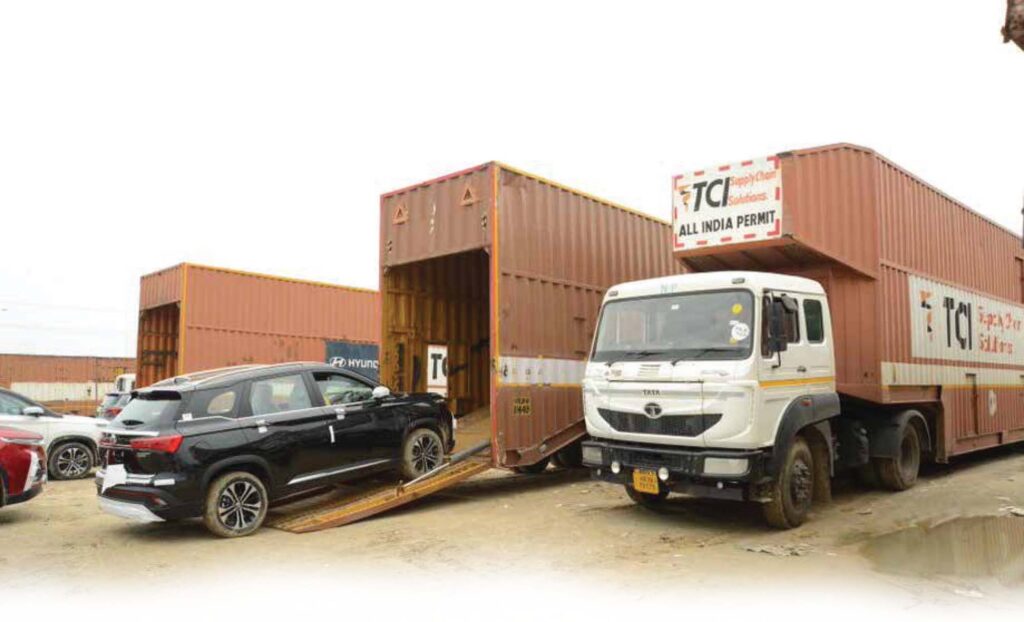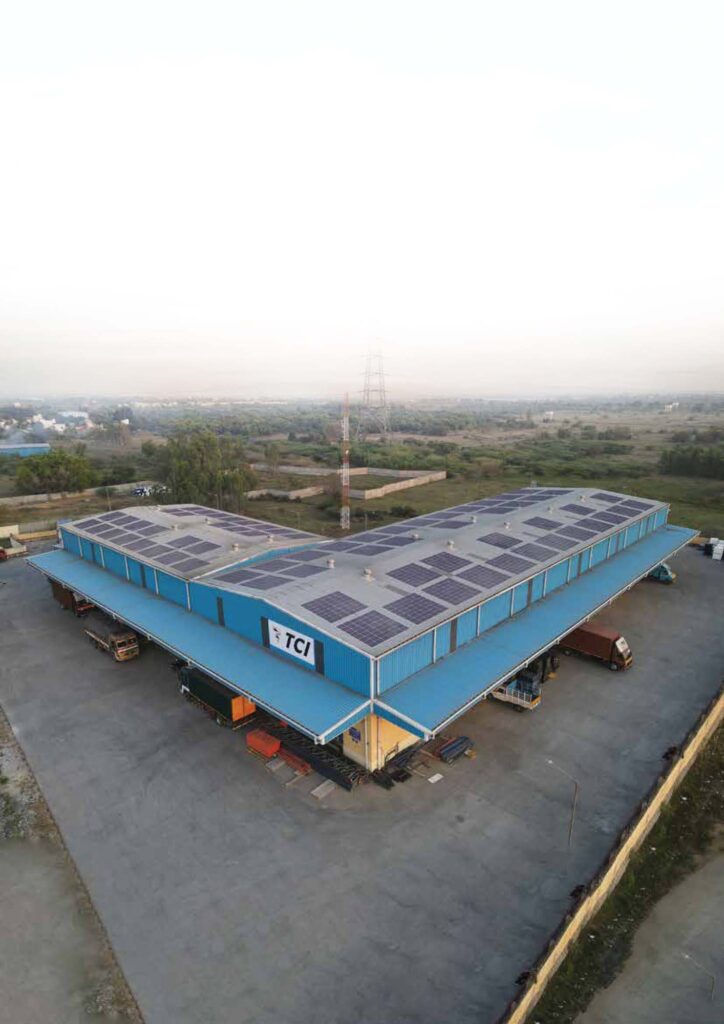
In a recent interview with Vineet Agarwal, MD of Transport Corporation of India (TCI) and President of Assocham, Rajesh Rajgor explores TCI’s path to success. The article places a spotlight on their core values, known collectively as CORE, which include Customer focus, Ownership, Responsiveness, and Empathy. It delves into how these principles have not only fueled TCI’s growth but have also empowered them to tackle challenges within the industry. The piece offers a comprehensive perspective on TCI’s triumphant journey, firmly grounded in their core values, extensive operations, and their unwavering dedication to sustainable and eco-friendly logistics practices.
TCI’s success is anchored in the CORE philosophy: Customer focus, Ownership, Responsiveness, and Empathy. These principles have not only fueled TCI’s expansion but have also empowered them to effectively navigate industry challenges. They underscore the importance of customer-centricity, diversification, employee development, and sustainability, all of which reflect their dedication to excellence.

Agarwal places a particular emphasis on ‘Customer focus’ as the first pillar of TCI’s success. He explains, “We’ve recognized that customers often have specific logistics needs beyond just transportation. By engaging with our customers and understanding their unique requirements, we’ve been able to design tailored services and products.” This customer-centric approach has enabled TCI to diversify into various domains, including freight supply chain, cold chain logistics, and rail transportation, consequently enhancing profit margins over the years.
TCI’s Strategic Diversification & Empowerment
Diversification within the logistics sector has been a critical strategy for TCI, providing stability and consistent growth by carefully managing different divisions. This approach proved invaluable during challenging times, such as the COVID-19 pandemic, where different segments thrived while others faced difficulties. Agarwal explains, “Diversification within logistics has been another crucial strategy. Our aim has been to provide stability and consistent growth by meticulously balancing its various divisions. For instance, during the challenging times of the COVID-19 pandemic, while the trucking sector faced difficulties, our rail business thrived. Later, when the shipping business flourished due to container shortages, our automotive logistics faced hurdles. However, as chip shortages resolved, the automotive logistics sector bounced back, demonstrating the benefits of having a diversified portfolio.”

Ownership is another essential aspect, emphasizing team and people development. TCI encourages employees to advance within the organization, resulting in high employee satisfaction rates. Responsiveness, on the other hand, involves robust processes, compliance, governance, and an ESG framework, ensuring operational efficiency and sustainability. Agarwal highlights this by saying, “We encourage our employees to grow within the organization, and our employee satisfaction rates are among the highest in the country. We invest in training and development, with employees often rising to top-level positions.”
TCI’s commitment to ‘Responsiveness’ is evident in its robust processes, compliance, governance, and an ESG (Environmental, Social, and Governance) framework. These pillars underpin efficient and sustainable operations, aligning seamlessly with the company’s goals of reducing carbon emissions and fostering responsible logistics practices. Agarwal elaborates further, stating, “We are converting a portion of our fleet to compressed natural gas (CNG), with approximately 20% of our fleet already using CNG. We are also exploring the use of electric vehicles for last-mile delivery.”
Furthermore, ‘Empathy’ is at the heart of TCI’s ethos, exemplified by its societal contributions and efforts to reduce carbon emissions. “Empathy plays a crucial role in dealing with stakeholders and fostering positive relationships,” Agarwal affirms.
TCI’s Reach, Sustainability, and Cold Chain Growth
Regarding the company’s current size and geographical reach, Agarwal provides comprehensive details, highlighting TCI’s extensive operations, including locations, warehouse sizes, fleet statistics, and workforce figures. “We operate in nearly 1,000 locations nationwide, with a diverse range of warehouse sizes to meet customer needs. Our fleet consists of approximately 1,000 owned trucks and about 10,000 trucks in operation at any given time, including vendor-owned and hired trucks. We employ around 4,500 individuals directly, with an additional 15,000 to 20,000 outsourced personnel, operating across six shifts. In terms of warehouse space, we cover approximately 14,000,000 square feet throughout the country, with a significant emphasis on efficient vertical storage in our large warehouses,” emphasizes Agarwal.
When discussing the evolution of the cold chain segment, Agarwal notes significant growth, especially after the COVID-19 pandemic. He attributes this growth to increased demand in pharmaceuticals, the quick-service restaurant (QSR) industry, fast-moving consumer goods (FMCG), and specialty chemicals, along with TCI’s involvement in battery transport and storage in cold storage for the automotive sector. He characterizes this evolution as “Cold Chain version 3.0,” emphasizing that COVID-19 accelerated the transition, leading to more value addition and growth prospects.
TCI’s commitment to sustainability and achieving zero emissions is a top priority. Agarwal details various steps they’ve taken, including converting a portion of their fleet to compressed natural gas (CNG), exploring electric vehicles for last-mile delivery, using low Sulphur fuel for ships, and adhering to BS VI emission standards for trucks. They also extensively utilize solar power in their facilities and warehouses, aiming to be as environmentally friendly as possible. TCI actively collaborates with clients to promote green logistics practices, such as multimodal transportation.
Green Logistics, Government Collaboration, and Tech Advances
TCI’s commitment to sustainability is evident through their efforts to reduce carbon emissions, conversion to CNG, and exploration of electric vehicles. They actively collaborate with clients to promote eco-friendly logistics. Technology plays a pivotal role in their operations, with a focus on digitization, data analytics, and AI. TCI’s future goals involve market expansion, service diversification, and sustainability, positioning them as a leader in the logistics industry, contributing to India’s economic growth and global prominence.
TCI’s endeavors towards promoting greener and more efficient logistics in India. Agarwal explains, “TCI is actively involved in the National Logistics Policy, which focuses on reducing carbon emissions, improving logistics efficiency, and digitalization.” TCI’s commitment to sustainability is evident through its emphasis on multimodal logistics, integrating data from various sources for smoother transactions, and prioritizing standardization to streamline logistics processes. These measures are geared towards fostering a sustainable and efficient logistics ecosystem in India.
TCI’s involvement in government projects and initiatives, including Gati Shakti and G20, underscores the company’s dedication to enhancing the logistics sector, both nationally and on the global stage. According to Agarwal, “We collaborate with government bodies, suggest projects, and work on policy changes to benefit the logistics sector.” TCI’s contributions are pivotal for the growth and competitiveness of the logistics industry, aligning with India’s global economic aspirations.
Technology is at the core of TCI’s operations, with a steadfast commitment to digitization. “Technology plays a pivotal role in our operations,” Agarwal asserts, highlighting the use of mobile apps, data analytics, and AI. These technological advancements empower TCI to make informed decisions, optimize operational performance, and deliver superior services to stakeholders, keeping them at the forefront of the digital transformation.
Training, Maintenance, and Future Expansion
Addressing concerns about automation potentially replacing skilled manpower in the logistics sector, Agarwal emphasizes TCI’s approach to recruitment, retention, and training. “We place a strong emphasis on continuous training programs for both blue-collar and white-collar workers,” he states. TCI’s focus remains on reskilling and upskilling to adapt to changing technologies and job roles while retaining talent through engagement, recognition, and rewards.
Maintaining the reliability of transportation, including trucks and equipment, is paramount for TCI. Agarwal reveals that TCI has established rigorous systems for periodic maintenance and compliance checks. Dedicated teams oversee maintenance across operations, minimizing breakdowns, enhancing throughput, and ensuring compliance with regulations. Long-term partnerships with service providers through annual maintenance contracts (AMCs) further guarantee the highest quality of maintenance.
Looking towards the future, TCI has ambitious goals, including market expansion, service diversification, and reaching new clientele. Agarwal affirms, “Our goal is to align with market demands and provide value-added services to our clients. Our scope in the automotive industry covers various vehicle types, including four-wheelers, three-wheelers, two-wheelers, commercial vehicles, and earth-moving equipment. Our commitment to automotive logistics extends to using automotive rakes, either leased, hired, or owned, for efficient transportation, sometimes handling multiple rakes per day.” These objectives encompass investments in ships, containers, trucks, and warehousing facilities, with a resolute focus on sustainability and customer-centric strategies. TCI’s vision positions them as a key player in shaping India’s logistics landscape and contributing to its global economic aspirations.
Highlighting TCI’s significant presence in the automotive logistics sector, emphasizing their commitment to various automotive companies in India. Their services span a wide range, from just-in-time pickups to rail transport and spare parts management, encompassing diverse vehicle types. TCI’s dedication to the automotive industry is exemplified through efficient transportation methods, ultimately supporting the growth and success of this vital sector. With a commitment to innovation, sustainability, and customer satisfaction, TCI is poised to continue its journey as a leader in the logistics industry, contributing significantly to India’s economic growth and global prominence.